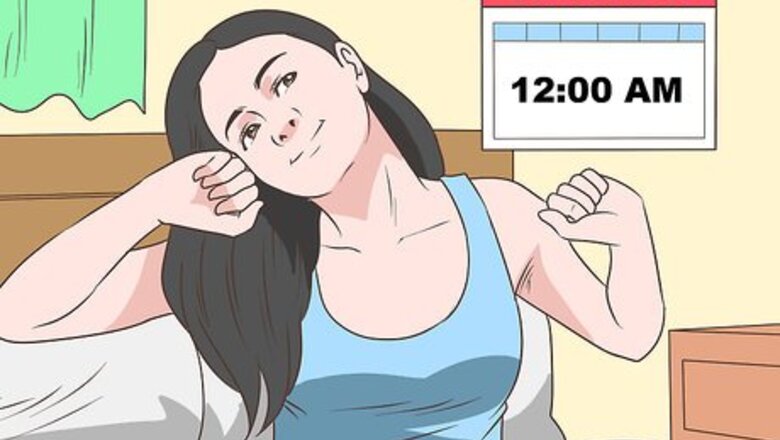
views
Adjusting Your Sleep Cycle
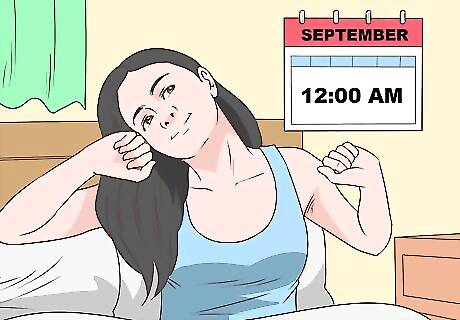
Practice by waking up at the same time for a month. Nerves in your brain control your body’s clock, known as your circadian rhythm. This rhythm is established by following a predictable routine, which is why you are able to wake up at the same time on the weekend as you are during the week if all factors are equal. So the best way to adjust your sleep cycle is to be consistent and make it a routine. Take care not to deprive yourself of sleep. Talk to a medical professional before attempting to change your sleep schedule for an extended period of time. More sleep isn't always healthier than less sleep. Consult a doctor if you’re struggling to sleep less than 9 hours or so.
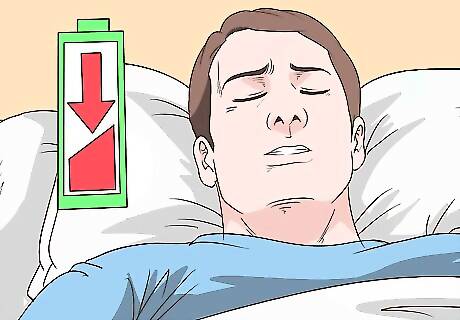
Sleep when you’re tired and wake up at the same time every day. If you stay up later than normal because you don’t feel tired, don’t force yourself to sleep but rather let your body adjust naturally. Eventually, you'll be tired earlier and will be able to easily fall asleep at an earlier time. Your body will naturally regulate your sleep schedule. Don’t feel frustrated if you can’t fall asleep. Focusing too hard on falling asleep can actually make it harder!
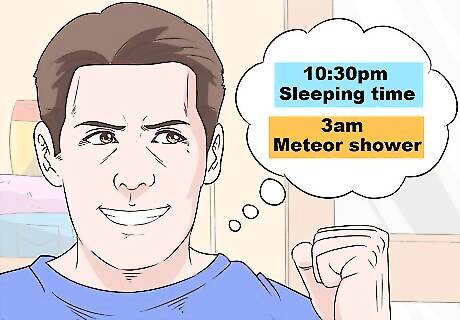
Plan your night’s schedule. Each of us have different capacities at which we can function with little to no sleep. Some of us can be fully alert with just 4 hours of sleep while others need more than 8. Calculate how much time you will need to get enough sleep to perform the task you want and set your night’s schedule accordingly. For example, if you want to catch a meteor shower at 3am and know you are able to function with only 4 hours of sleep, get into bed around 10:30pm. If you're just waking up in the middle of the night for a specific one-time event, planning exactly when you should go to bed is smart. If you're trying to adjust your sleep cycle for a longer period of time, let your new cycle come naturally and don't try to force it.
Waking Up
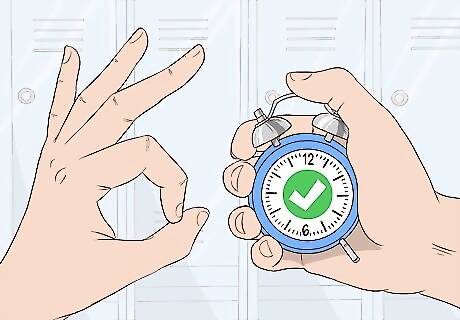
Set an alarm clock. Whether you already have one or need to buy a new one, an alarm clock is usually a necessity. If it is a digital alarm clock, go to the settings menu for personal preferences on volume, alarm type, and length.
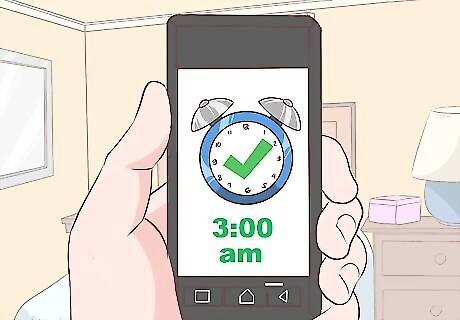
Set your mobile phone. With their size and convenience, mobile/cell phones are a great option to use as all come with an alarm function. Set the alarm close to you to ensure adequate volume. Test the alarm several times until you’re satisfied it’s loud enough to wake you and will work at the correct time. Make sure not to make it too loud if you don’t want to wake up others within earshot, but don't make it too quiet so as to render it useless.
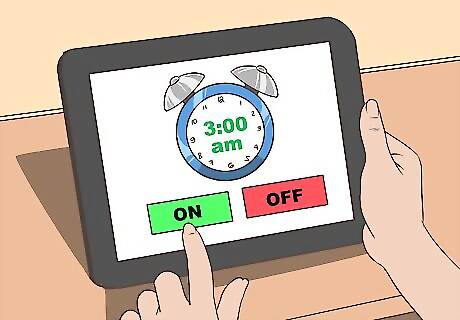
Use your tablet or computer. If you don't have an alarm clock and the default alarm on your mobile phone doesn’t meet your needs, there are a number of apps to help you wake up. Read user feedback and customer reviews to get a sense of how each app has served other people and install into your phone, tablet, or desktop. Make sure to check whether the app is free or if it requires a payment.
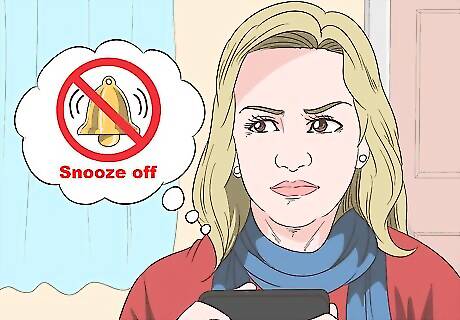
Avoid alarm functions like multiple alarms or “snooze” modes. Be cautious of these functions because they can usually be activated when you are half-conscious and instinctively reaching to shut off your alarm. Activating the snooze button too many times can make you even more tired. When you hear an alarm, adrenaline and cortisol trigger a stress response to wake you up immediately. Pressing the snooze button suppresses this response, leaving you feeling disoriented and groggy.
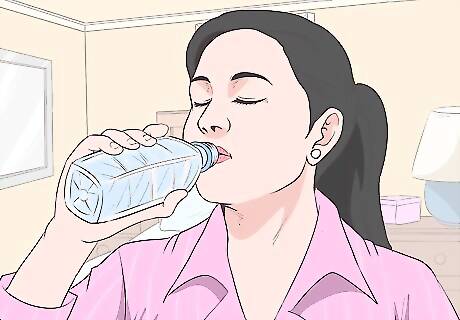
Drink water before you go to bed. Another important bodily function is urination. Water can wake you up in the middle of the night; however, the amount of water needed for you to do so can only be known through trial and error based on a number of factors including weight and age. Err on the side of caution and either drink enough water that you feel full or test yourself on another night to see what works. Even though drinking a lot of water will wake you up, there is no set calculation to determine when you will be getting up.

Inform anyone that you are living with of your plans to wake up in the middle of the night -- unless your plan involves surprising them. Including everyone will give them a chance to help you get up if they happen to be up too. Moreover, people in your household may hear your alarm if you’ve overslept and get you up to tend to your responsibility.

Ask a friend to give you a wake up call. Whether your friend is a fellow shift worker or joining you in a late-night adventure, a phone call in the middle of the night is very jarring. Keep your phone in close proximity where you know you’ll hear it and make sure your ringer is turned on. Test the ringer volume before going to bed to make sure it will be loud enough. This method can be rather unreliable depending on the friend you choose. You may also want to offer your friend an incentive to ensure they follow through or pay a calling service instead.
Staying Up Once Awake
Keep the 90-minute rule. There is research that suggest our sleep cycles in 90-minute intervals. Each 90-minute cycle includes two doses of REM (Rapid Eye Movement) sleep and one non-REM sleep. REM is the deepest cycle of sleep so optimize your sleep by keeping it in intervals of 90 minutes. Waking up at the end of a 90-minute REM cycle will leave you much more alert and awake than waking up in the middle of non-REM sleep. While some people think the 90-minute rule has a positive effect, current research does not support its use. Train your body to sleep less by cutting down incrementally. Cut down your sleep 30 minutes at a time. For example, cut down your sleep from 8 to 7 ½ hours in one week then reduce it to 7 the next until you’re down to your ideal sleep schedule.
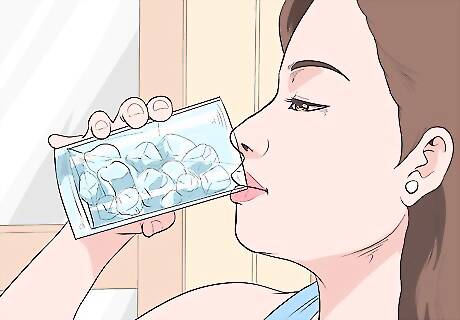
Utilize the power of cold water. Drinking a glass of cold water in the morning will jump start your metabolism. You can also jump into a cold shower or splash cold water onto your face. The sudden drop in temperature will be very jarring to your body and will immediately get you alert. While some people think drinking cold water has a positive effect, more research needs to be done to determine whether it is effective. Going outside with damp hair or moisture on your skin will further wake you up as the fresh air continues to drop your temperature.

Have some coffee. Caffeine has long been known to help people wake up. If you have already established a solid coffee routine and feel like it no longer works, reduce the amount of sugar and milk or the type of coffee that you are drinking. Some brands have a higher caffeine content. While caffeine gives you a short burst of energy, caffeine consumed at night may cause more harm than good and lead to insomnia. Caffeine is a stimulant that triggers a short-term rise in blood pressure, so don’t depend on coffee as a permanent solution as your body will quickly build an immunity. People with poor heart health should consult their medical professional before developing a regular caffeine routine. Find a diner or late-night establishment that serves the type of coffee that’s right for you. Forcing yourself to go somewhere and interact with others will keep you up.




















Comments
0 comment